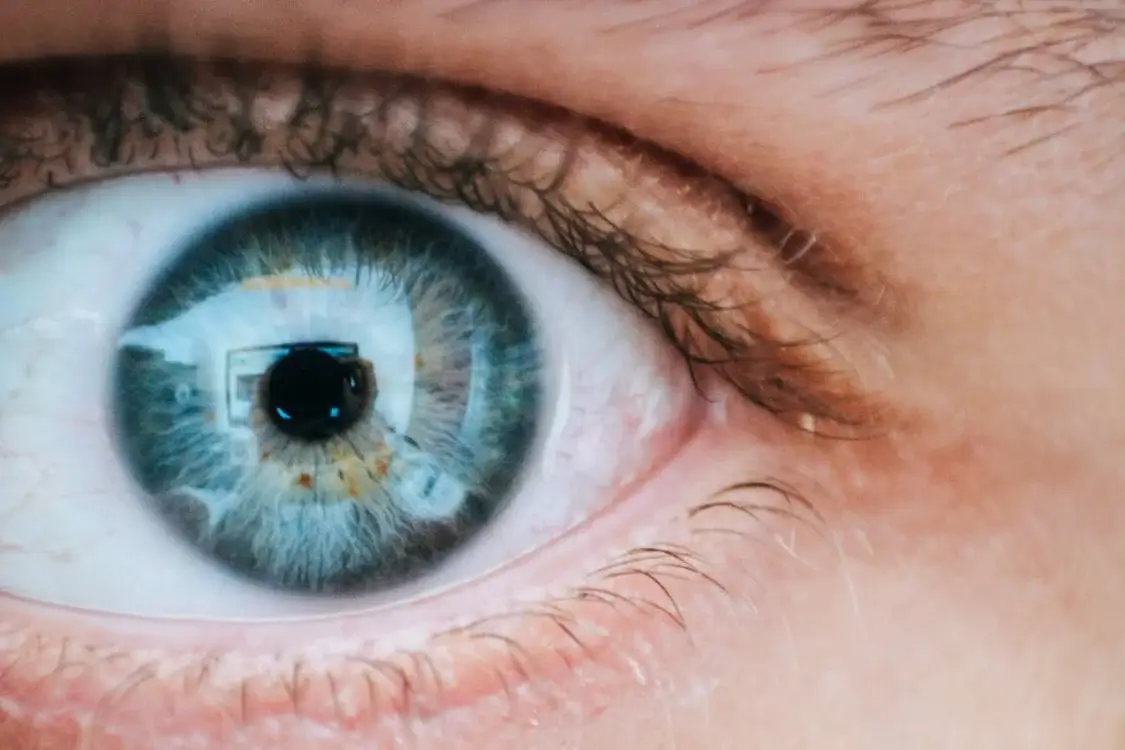In Focus:
- You can change your eye colour permanently through eye colour change surgery.
- The surgical procedures that can change eye colour include iris implant surgery and two laser eye colour change procedures: keratopigmentation and depigmentation.
- Achieving your dream eye colour may not be worth eye colour change surgery risks.
You probably have brown eyes. After all, brown is the most common eye colour, occurring in 79% of the world’s population.
If you’re one of the more than 6.3 billion people with brown eyes, you may be wondering, ‘Can I change my eye colour to something a little less common, such as green?’
After all, if there’s LASIK surgery in Dubai to reshape the cornea so you can see better, wouldn’t there be an equivalent laser eye colour change procedure you can undergo to change your eyes from a common brown colour to an unusual gold, a unique shamrock, or a rare silver?
Interesting note on eye colours: Blue is not as uncommon a colour as you may think; up to one out of 10 persons in the world has this eye colour (8-10% occurrence rate). Hazel (yellowish or golden brown) is less common at 5%, and green is unique at 2%. The rarest eye colours, however, are red, violet, and grey.
It’s also worth noting that eye colour depends on the action of (and interaction among) as many as 16 genes. Since eye colour is the outcome of a complex process, having two green-eyed parents does not preclude the possibility of a brown-eyed offspring—so no, having green eyes will not guarantee green-eyed children.
Ask any eye doctor in Dubai. Ophthalmologists will confirm there are three ways to permanently change eye colour: laser keratopigmentation, laser depigmentation and coloured iris implant surgery. However, they’ll advise you not to do any of them and to opt for coloured contact lenses instead.
Can you still undergo surgery to change eye colour? Of course, you can—but we urge you to reconsider.<h2> Surgery to Change Eye Colour
There are three main surgical procedures that can permanently change eye colour: laser keratopigmentation, laser depigmentation, and coloured iris implant surgery.
1. Laser keratopigmentation
Keratopigmentation is a portmanteau of ‘kerato’, which means relating to the cornea, and ‘pigmentation’, which is synonymous with colouring. Laser keratopigmentation, also called ‘eye tattooing’, refers to a laser procedure that colours the cornea, which is the clear dome-like structure at the front of the eye.
In laser keratopigmentation, an ultrashort pulse laser creates circular micro-tunnels between the corneal layers. This approach is comparable to the technique used when inserting intrastromal corneal ring segments for keratoconus treatment.
2. Laser Iris Depigmentation
Laser iris depigmentation, also known as photoablative iridosplasty, is a multi-session procedure designed to correct heterochromia or pigmentary disorders of the iris. However, it is most frequently indicated for purely cosmetic reasons.
In this particular laser eye colour change procedure, a low-energy laser targets the dark pigments (i.e., melanin pigments) that dominate the surface of the iris. This diminishes the concentration of dark pigments, revealing more of the blue or green pigments.
Ultimately, laser iris depigmentation changes eye colour by stripping off dark-coloured melanin layers and exposing the lighter colours underneath.
3. Iris Implant Surgery
Iris implantation entails creating an incision between the cornea and sclera (the white of the eyes), through which a coloured iris prosthesis (i.e., iris implant) is inserted and sutured in place. It is often done in combination with other corrective procedures, such as phakic intraocular lens implantation, cataract surgery or corneal transplantation.
Iris implant surgery is indicated in the partial or complete loss absence of the iris (i.e., aniridia) due to a congenital condition, trauma, or surgical damage. However, some people undergo this surgery to change eye colour. In cosmetic cases like this, the iris implant is laid on top of a perfectly functional iris.
Eye Colour Change Surgery Risks
Any surgery involving the eyes, even minimally invasive laser eye colour change surgery, carries certain risks. The above procedures can give rise to complications that may ultimately lead to vision impairment, eye disorders, or even blindness.
1. Laser keratopigmentation
Laser keratopigmentation poses the following risks:
- Light sensitivity: A medium-to-long-term clinical evaluation of keratopigmentation outcomes revealed light sensitivity as the most common complication (30% incidence rate) within the first month of surgery.
- Corneal injury or perforation: Creating the circular tunnels for dye injection might lead to irreversible corneal damage.
- Allergic reaction: You’ll have a reaction if you’re allergic to the dye.
- Infection: If the dye or the equipment used is contaminated, you can suffer from bacterial or fungal infection, which can scar the cornea and lead to other complications.
- Dye leakage: If the cornea is perforated, the dye can leak into the eye and clog its drains, which in turn can lead to ocular hypertension.
- Uneven or fading colouration: Precise dye application is necessary for evenly coloured eyes, and any leakage will cause the colour to eventually fade.
2. Laser Iris Depigmentation
Laser iris depigmentation is risky for the following reasons:
- Blocked eye drains: The depigmentation creates pigment debris or deposits that can clog the eye’s drains. This can lead to ocular hypertension. Chronically elevated pressure in the eyes can be a risk factor for glaucoma.
- Iris inflammation: The procedure can cause (an often temporary) inflammation of the iris.
- Undesirable eye colour: Removing the darker pigments will lighten eye colour, but it’s not guaranteed that you’ll get a vibrant eye colour. Instead, your eyes may simply look washed out.
- Light sensitivity: Iris depigmentation may temporarily dilate your pupil, causing light sensitivity.
3. Iris Implant Surgery
Iris implant surgery can lead to devastating complications, including:
-
- Chronic uveitis. Iris implantation can cause recurring inflammation of the middle layer of the eye (i.e., the uvea). Treating this condition can lead to further complications.
- Increased intraocular pressure: The artificial iris implant can obstruct the eye and chafe the iris, increasing pigment deposits. Steroids used to treat uveitis can also lead to ocular hypertension. All these can elevate intraocular pressure.
- Glaucoma: Sustained high intraocular pressure is a significant risk factor for glaucoma. The iris implant may also adhere to the anterior chamber angle, cause tissue damage, and make you require glaucoma treatment.
- Cataract: The corticosteroid therapy indicated for chronic eye inflammation can lead to cataract formation or cloudiness in the lens.
- Corneal injury or decompensation: Contact with the iris implant can injure the cornea.
Are the Risks Worth It?
The American Academy of Ophthalmology (in fact, almost all of the world’s ophthalmic societies) does not recommend laser keratopigmentation and cosmetic artificial iris implants. We also agree that eye colour change surgery calls for a good deal of caution.
We at Gulf Family Clinic caution anyone thinking of undergoing any type of eye surgery just to change their eye colour.
Iris implantation should be done only for functional reasons—e.g., to address the partial or total absence of an iris. We do not recommend operating on the cornea for purely cosmetic reasons. Furthermore, while laser iris depigmentation may have fewer possible complications, we still do not recommend it as it still comes with certain risks.
No. Not even actor Ian Somerhalder’s piercing grey eyes or Angelina Jolie’s smouldering green orbs are sufficient reasons to risk the potential complications posed by eye colour change surgery.
Gulf Family Clinic is an eye clinic in Dubai that offers world-class ophthalmic care for children and adults.
Contact us now to learn more about our therapeutic and specialist services, including ortho-K, LASIK, squint correction, glaucoma, and more.








